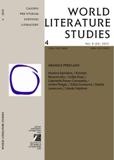Prepisovanie novozákonných príbehov v apokryfoch Karla Čapka
Rewriting New Testament Stories in Karel Čapek’s Apocrypha
Author(s): Gabriella Csizmadia PetresSubject(s): Literary Texts
Published by: Ústav svetovej literatúry, Slovenská akadémia vied
Keywords: Apocrypha; Irony; Perspective; Minor Character; Profanation
Summary/Abstract: The Bible, considered as the book of books, has created a broad textual world: a wide range of post-texts was born on the basis of canonical texts. The mediation of biblical stories was carried out not only by the translation of canonical texts into various languages, but apokriphal writings also started to appear simultaneously with texts qualified as sacred – these apokriphal texts have been documented as popular literary genres. The 20th century pseudo-biblical texts are specific translations of biblical stories: they retell the events of the Old and the New Testament through the author’s worldview, which provides the texts with satirical-ironical features through the procedures of imitation, pastiche, irony or parody. The paper presents the world of Karel Čapek’s New Testament apokriphs, which employs the tools of profanation, complementing and rewriting during the translation of the well-known texts into 20th century thinking. The primary goal of rewritings is to make reception processes more problematic and by questioning authenticity they generate a more suspicious reading. The texts mostly keep the basic plot, however, they highlight the events from a new perspective and result in shifts in focus – they magnify the minor events considered as unimportant from the point of view of canonical events, add new information, respectively shift the minor characters’ perspective to the forefront.
Journal: World Literature Studies
- Issue Year: V/2013
- Issue No: 4
- Page Range: 41-49
- Page Count: 9
- Language: Slovak

